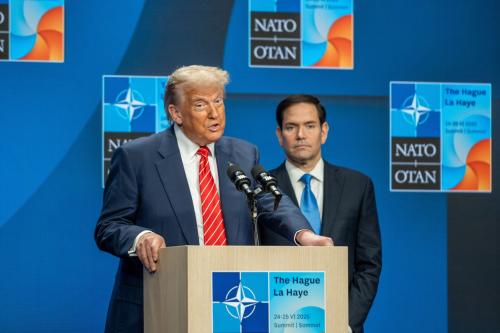Ever since Turkey shot down a Russian aircraft (allegedly in Turkish airspace) on November 24, Russia has sought to “de-escalate tensions” in a rather heavy-handed way. Trying to leverage the international system to get Turkey to meet Moscow’s conditions—including an apology, compensation, and the prosecution of those responsible—Russian leaders have demanded terms that make reconciliation highly unlikely. And Russian President Vladimir Putin’s latest inflammatory rhetoric doesn’t help.
The Russians are running out of options short of military reprisal, and their language portends military retaliation. What will Russia do next?
Who’s the real provocateur?
Russian rhetoric is becoming irrationally defensive, portraying the Turks as provocateurs and violators of international law. The allegations, including by Russia, that Turkey has benefited from illicit oil sales with ISIS raise legitimate concerns about the Turkish government’s conduct. But Russian accusations that the presence of Turkish troops in northern Iraq is a “reckless and inexplicable” violation of Iraqi sovereignty seem diversionary and instigative. (United Nations representatives judged it a bilateral issue, and the Turks removed some of the troops in question.) Russia has also accused the Turks of everything from delaying Russian maritime movement through the Bosporus—a violation of the Montreux Convention—to shadowing Russian combatants in the Mediterranean.
Rhetorically, at least, the Russians may be running out of options for further demonizing Turkey.
Legitimate actions, but few real options
Beyond the rhetoric, the Russian response to the Turkish shoot-down has included a mix of military, economic, and diplomatic actions. All project a semblance of legitimacy, and some may be precursors to the use of force.
Militarily, the Russians are padding their defensive capabilities against perceived coalition intervention and Turkish aggression. They’ve engaged in continuous military posturing, to include targeting U.S. aircraft over northern Syria. They’ve moved S-400 surface-to-air systems to Syria to provide a tactical level anti-access, area denial capability against the U.S.-led coalition and the Turks. The step is analogous to NATO’s provision of Patriot batteries to Turkey to defend against Syrian missiles in 2012—a big move at the time. This one has actually had far greater consequences, forcing coalition manned air operations over northern and eastern Syria to cease. And at sea, Russia has threatened to employ its navy to destroy any targets that pose a danger. A Russian ship recently displayed defensive weapons while transiting Turkish straits. On another occasion, a Russian naval vessel fired warning shots at a Turkish civilian vessel it deemed to have come too close. While these actions alone are not entirely beyond the pale of military behavior, the questionable employment of an assortment of weaponry accompanied by highly confrontational rhetoric, make them all the more threatening.
Economically, Russia has imposed sanctions on Turkey—that’s a legitimate retaliatory step. But Russia is the real loser, because the sanctions shut the door on lucrative deals that would have provided greater Russian access, influence, and credibility throughout the Middle East. Sanctions require tremendous patience to see results, and it’s not clear whether Russia has the commitment to see them through or influence to be effective. No other country has lined up to second the effort, and very few will benefit from the limited opportunities that sanctions create in Russian markets.
Diplomatically, Russia’s U.N. ambassador addressed the U.N. Security Council about the Turkish shoot-down—again, this was a legitimate avenue for redress. But by all accounts, the Security Council rejected Russia’s case against Turkey. It has not condemned the Turks for either the shoot-down or their presence in northern Iraq. To the contrary, Iraqi representatives, while disparaging of the Turks, criticized Russia’s accusations, stating that they were aware of the Turkish presence. Russia’s role on the Security Council underscores its status within the international system—having now used its veto four times to block action on Syria, it has assured that there will be no solution without its approval. But this time, Russia played its Security Council card to no avail, and it has now generated further suspicions about its intentions vis-à-vis Turkey.
Tough talk
Russian saber-rattling will undoubtedly continue—they’ll continue to talk recklessly of using tactical nuclear weapons to combat ISIS and leveraging the Kurds against Turkish aspirations in the region. Translation: Russia will do whatever it takes to achieve its end-state in Syria.
Importantly, however, the Russians are also warning NATO. Having decided they cannot work with the present Turkish government (even if it apologizes), the Russians will not allow the Turks to be the regional players they aspire to be. Further Russian diplomatic and military posturing is expected, and the hope is that cooler heads within the Kremlin prevail. But NATO needs to reemphasize to the Turks that they need to avoid provocation at all cost, reiterate its commitment to Article V, and preposition forces near Turkey to deter a Russian reprisal. None of Russia’s options have delivered Turkish acquiescence, and NATO must prepare itself for the possibility that nothing short of an eye for and eye will appease Vladimir Putin’s obsession for payback.
The Brookings Institution is committed to quality, independence, and impact.
We are supported by a diverse array of funders. In line with our values and policies, each Brookings publication represents the sole views of its author(s).




Commentary
An eye for an eye: Will Russia retaliate against Turkey?
December 22, 2015